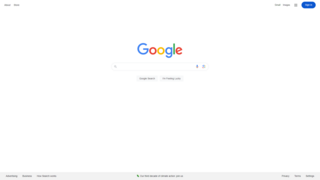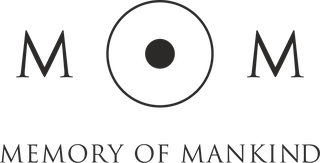
Google Search is a search engine provided and operated by Google. Handling more than 3.5 billion searches per day, it has a 92% share of the global search engine market. It is the most-visited website in the world. Additionally, it is the most searched and used search engine in the entire world.
Telepresence refers to a set of technologies which allow a person to feel as if they were present, to give the appearance or effect of being present via telerobotics, at a place other than their true location.
New media are communication technologies that enable or enhance interaction between users as well as interaction between users and content. In the middle of the 1990s, the phrase "new media" became widely used as part of a sales pitch for the influx of interactive CD-ROMs for entertainment and education. The new media technologies, sometimes known as Web 2.0, include a wide range of web-related communication tools such as blogs, wikis, online social networking, virtual worlds, and other social media platforms.

BBC Online, formerly known as BBCi, is the BBC's online service. It is a large network of websites including such high-profile sites as BBC News and Sport, the on-demand video and radio services branded BBC iPlayer and BBC Sounds, the children's sites CBBC and CBeebies, and learning services such as Bitesize and Own It. The BBC has had an online presence supporting its TV and radio programmes and web-only initiatives since April 1994, but did not launch officially until 28 April 1997, following government approval to fund it by TV licence fee revenue as a service in its own right. Throughout its history, the online plans of the BBC have been subject to competition and complaint from its commercial rivals, which has resulted in various public consultations and government reviews to investigate their claims that its large presence and public funding distorts the UK market.
Alternative media are media sources that differ from established or dominant types of media in terms of their content, production, or distribution. Sometimes the term independent media is used as a synonym, indicating independence from large media corporations, but this term is also used to indicate media enjoying freedom of the press and independence from government control. Alternative media does not refer to a specific format and may be inclusive of print, audio, film/video, online/digital and street art, among others. Some examples include the counter-culture zines of the 1960s, ethnic and indigenous media such as the First People's television network in Canada, and more recently online open publishing journalism sites such as Indymedia.

Vizrt, short for Visualization in Real-Time or Visual Artist, is a Norwegian company that creates content production, management, and distribution tools for the digital media industry. It's products includes applications that create real-time 3D graphics and maps, visualised sports analysis, media asset management, and single workflow solutions for the digital broadcast industry.
Answers.com, formerly known as WikiAnswers, is an Internet-based knowledge exchange. The Answers.com domain name was purchased by entrepreneurs Bill Gross and Henrik Jones at idealab in 1996. The domain name was acquired by NetShepard and subsequently sold to GuruNet and then AFCV Holdings. The website is now the primary product of the Answers Corporation. It has tens of millions of user-generated questions and answers, and provides a website where registered users can interact with one another.

Web conferencing is used as an umbrella term for various types of online conferencing and collaborative services including webinars, webcasts, and web meetings. Sometimes it may be used also in the more narrow sense of the peer-level web meeting context, in an attempt to disambiguate it from the other types known as collaborative sessions. The terminology related to these technologies is exact and agreed relying on the standards for web conferencing but specific organizations practices in usage exist to provide also term usage reference.

The Space Generation Advisory Council (SGAC), in support of the United Nations Programme on Space Applications, is a non-governmental organization and professional network that "aims to bring the views of students and young space professionals to the United Nations (UN), space industry, and other organizations." SGAC has the clear purpose of connecting, inspiring, engaging, and advocating; it works to raise awareness among the next generation of space professionals on a global scale. The SGAC network currently represents over 25,000 members across 165 countries – the world's largest network of students, young professionals, and alumni in the space industry. SGAC operates in the six official languages of the United Nations, though the official working language is English.
onedotzero is a contemporary digital arts organisation based in London that aims to promote new work in moving image and motion arts. The organisation conducts public events, artist and content development, publishing projects, education, production, creative direction, and related visual art consultancy services.
Editing technology is the use of technology tools in general content areas in education in order to allow students to apply computer and technology skills to learning and problem-solving. Generally speaking, the curriculum drives the use of technology and not vice versa. Technology integration is defined as the use of technology to enhance and support the educational environment. Technology integration in the classroom can also support classroom instruction by creating opportunities for students to complete assignments on the computer rather than with normal pencil and paper. In a larger sense, technology integration can also refer to the use of an integration platform and application programming interface (API) in the management of a school, to integrate disparate SaaS applications, databases, and programs used by an educational institution so that their data can be shared in real-time across all systems on campus, thus supporting students' education by improving data quality and access for faculty and staff.
"Curriculum integration with the use of technology involves the infusion of technology as a tool to enhance the learning in a content area or multidisciplinary setting... Effective integration of technology is achieved when students are able to select technology tools to help them obtain information in a timely manner, analyze and synthesize the information, and present it professionally to an authentic audience. The technology should become an integral part of how the classroom functions—as accessible as all other classroom tools. The focus in each lesson or unit is the curriculum outcome, not the technology."
User experience design is the process of defining the experience a user would go through when interacting with a company, its services, and its products. Design decisions in UX design are often driven by research, data analysis, and test results rather than aesthetic preferences and opinions. Unlike user interface design, which focuses solely on the design of a computer interface, UX design encompasses all aspects of a user's perceived experience with a product or website, such as its usability, usefulness, desirability, brand perception, and overall performance. UX design is also an element of the customer experience (CX), which encompasses all aspects and stages of a customer's experience and interaction with a company.
Mobile local search is a technology that lets people search for local things using mobile equipment such as mobile phones, PDAs, and other mobile devices. Mobile local search satisfies the need to offer a mobile subscriber spontaneous access to near-position services and information such as businesses, products, events, restaurant, movie theatre or other local information. Mobile local search is the search and discovery of persons, places, and things within an identifiable space defined by distinct parameters. These parameters are evolving. Today they include social networks, individuals, cities, neighborhoods, landmarks, and actions that are relevant to the searcher's past, current, and future location. These parameters provide structure to vertically deep and horizontally broad data categories that can stand-alone or are combined to comprise searchable directories.

The One Million Masterpiece is the largest artistic collaboration ever attempted. It is an ongoing project to produce a true piece of global artwork. As of October 16, 2007, 26,582 artists from 174 countries have participated, with $19,348.57 raised for charities worldwide.
Sharon Grace is an American artist, currently a Professor Emeritus at the San Francisco Art Institute, who is known for initiating the use of many forms of electronic media based in audiovisual technology. Since 1970, Grace has worked with telecommunications as art, embedding interactive video and speech recognition in her work including video installation, electronic synthesis, interactive digital systems, and sculpture in stone and steel.

An interactive urinal is a device that allows users to play video games or control interactive displays while urinating. Several designs have been produced to date, usually comprising a urinal fitted with a pressure sensor to measure the strength and position of the urine flow and an LCD screen mounted above the urinal to provide animated graphics.
Live conferencing refers to the live streaming of interactive audio and video presentations, lectures, meetings, and seminars to the global audience with the help of a camera and conferencing equipment. Such equipment lets businesses connect and coordinate with remote workforces located in different region, engage them in productive real-time discussions, and record individual or group responses.
Global citizenship education (GCED) is a form of civic learning that involves students' active participation in projects that address global issues of a social, political, economic, or environmental nature. The two main elements of GCE are 'global consciousness'; the moral or ethical aspect of global issues, and 'global competencies', or skills meant to enable learners to participate in changing and developing the world. The promotion of GCE was a response by governments and NGOs to the emergence of supranational institution, regional economic blocs, and the development of information and communications technologies. These have all resulted in the emergence of a more globally oriented and collaborative approach to education. GCE addresses themes such as peace and human rights, intercultural understanding, citizenship education, respect for diversity and tolerance, and inclusiveness.

Memory of Mankind (MOM) is a preservation project funded in 2012 by Martin Kunze. The main goal is to preserve the knowledge about present human civilization from oblivion and collective amnesia. Information is printed on ceramic tablets, then stored in the salt mine of Hallstatt, Austria. More than a simple archive project, it aims to create the "time capsule of our era", letting people participate by allowing them to submit texts and images. In contrast to national archives, content for MOM is collected by anyone who takes part. It is a collective, "bottom-up" told history.
2023 International Horticultural Exposition or Expo 2023 is an International Horticultural Expo to be hosted by Doha, Qatar. The Horticultural Expo 2023 Doha will begin on October 2, 2023 and conclude on March 28, 2024. Originally scheduled to be held from 14 October 2021 to 17 March 2022, but it was rescheduled to 2023 due to the COVID-19 pandemic. The Bureau International des Expositions (BIE) general assembly in Paris formally recognised it on 22 November 2018 as an International Horticultural Exhibition. The Expo will be organized under the theme "Green Desert, Better Environment". An 80-hectare (200-acre) site has been identified.







